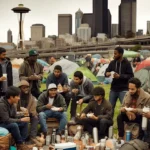Donald Trump has taken decisive action on immigration policy at the start of his second term, marking a significant shift in U.S. border security strategy. On January 20, 2025, in a sweeping move, Trump declared the United States to be under invasion and ordered the military to seal the southern border.
This decision comes alongside new directives for the Department of Homeland Security (DHS) to construct facilities to detain individuals deemed removable aliens. This aggressive approach seeks to reshape America's stance on immigration and national security, a marked departure from his first term.
Simultaneously, Chicago faces a growing crisis as it grapples with the impact of illegal immigration. Residents express frustration over perceived preferential treatment toward immigrants and question resource allocation amid local hardships. This tension highlights a broader national debate on immigration policy as cities like Chicago become focal points for discussing the balance between humanitarian aid and local needs.
Trump’s Bold Immigration Strategy
On January 20, 2025, President Donald Trump initiated a series of executive orders as part of his renewed commitment to stringent immigration control. His declaration of America being under invasion underscores a dramatic pivot in policy to reinforce national security. The directive to deploy the military to the southern border is intended to curb illegal entry into the United States, a move that has sparked both support and controversy.
The DHS has been tasked with creating facilities to detain individuals identified as removable aliens. This involves expanding detention capabilities, which Trump argues is crucial for maintaining order and safety. The administration's actions reflect a broader strategy to prioritize border security and streamline immigration enforcement, aligning with Trump's campaign promises of a tougher stance on immigration.
Chicago’s Immigration Dilemma
As Trump implements federal measures, Chicago faces its challenges with illegal immigration. The city has become a microcosm of the national debate, with residents voicing concerns over the influx of immigrants. Many Chicagoans argue that resources are being diverted from local needs, such as housing and social services, to accommodate immigrants. This has increased tensions and protests as residents demand more attention to their issues.

The situation in Chicago highlights the complexities of immigration policy at the municipal level. City officials must balance federal directives with local demands. Residents' pushback underscores the need for comprehensive solutions that address humanitarian responsibilities and local communities' well-being.
The Broader National Impact
Trump’s actions and the situation in Chicago reflect the broader national discourse on immigration. The president’s decision to fortify the southern border with a military presence is a clear statement of his administration’s priorities. Supporters argue this is necessary to protect national interests and prevent unlawful entry. Critics, however, raise concerns about the humanitarian implications and the potential strain on U.S. resources.
Chicago's local pushback adds another layer to the conversation. The city’s experience illustrates the challenges of managing immigration at the local level, where the impact of federal policies is felt most acutely. As cities navigate similar issues, the need for a balanced approach that considers security and compassion becomes increasingly evident.
Looking Ahead
The developments in U.S. immigration policy and their effects on cities like Chicago will likely shape the national debate for years. Trump's aggressive measures signal a new era in immigration enforcement that prioritizes security and control. However, as local communities grapple with the realities of these policies, the conversation around immigration remains complex and multifaceted.
The unfolding situation demands careful consideration of national security and humanitarian concerns. As the administration and local governments work to address these challenges, the outcomes will have significant implications for future immigration policy and the social fabric of American cities. The ongoing dialogue will be crucial in finding a path forward that respects the rule of law and the diverse needs of communities nationwide.

Lifelong bacon junkie. Lifelong internet fanatic. Hipster-friendly travel aficionado. Twitter lover. Avid food buff. Incurable travel trailblazer.













